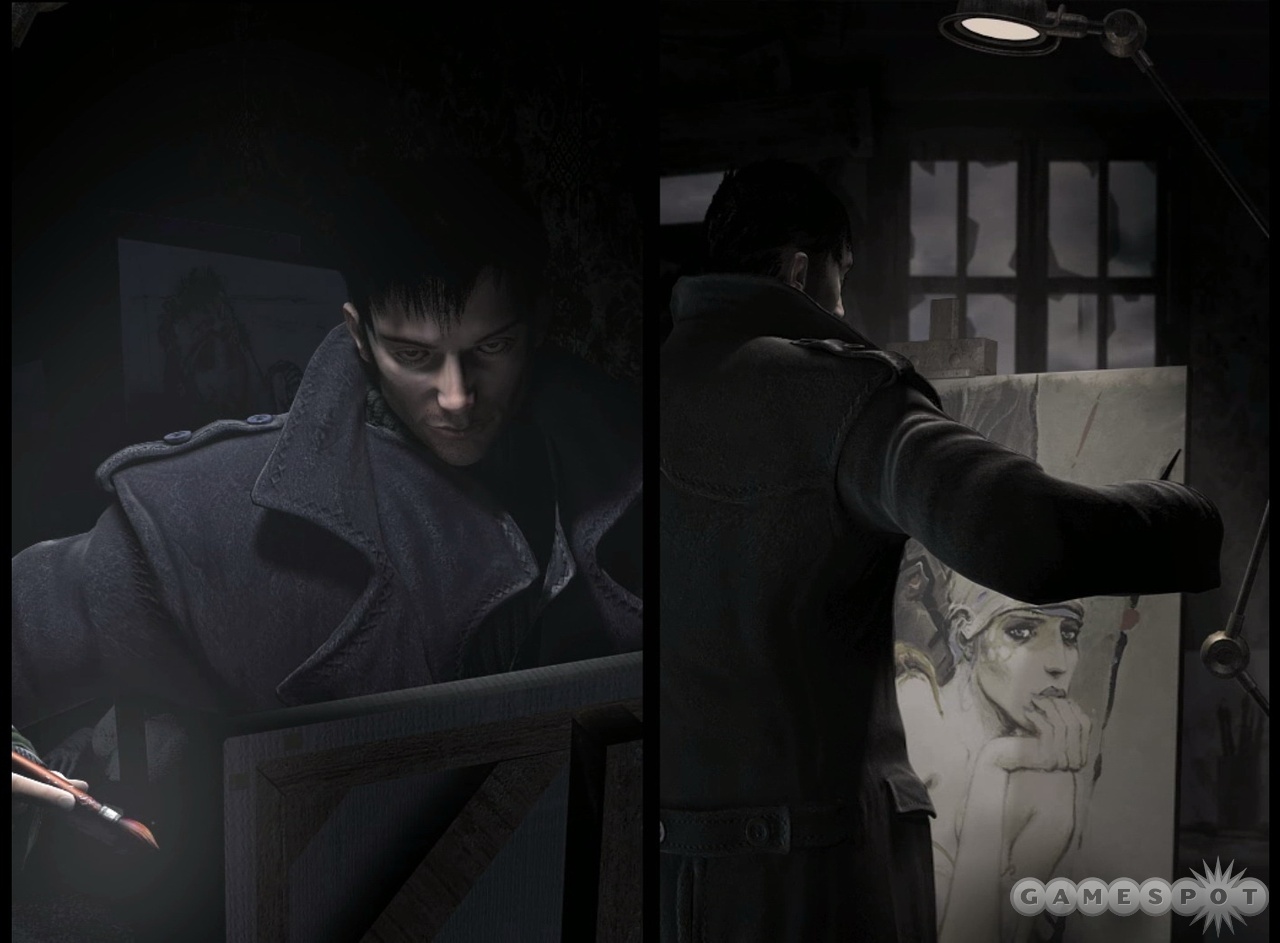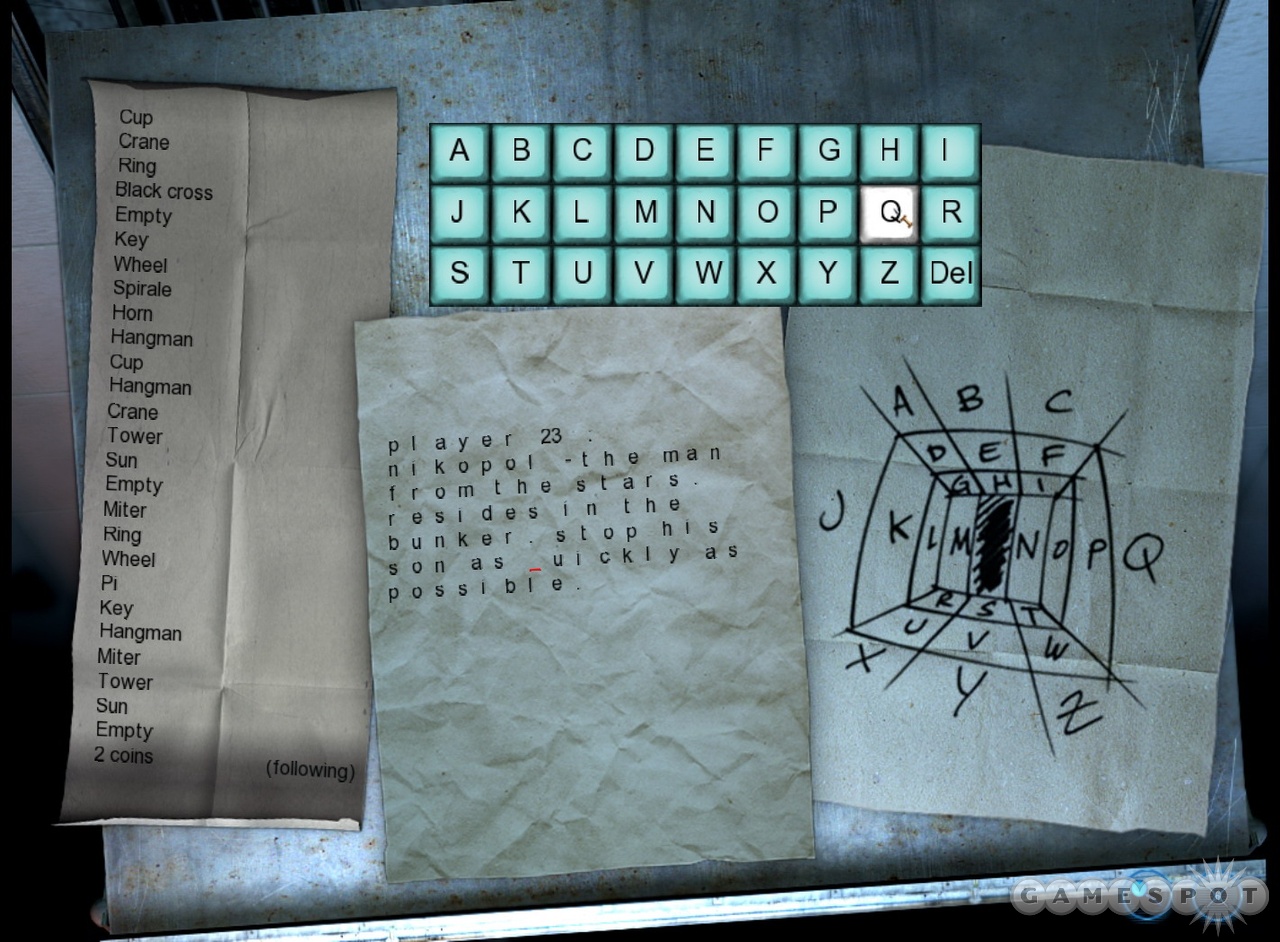If you know anything about Benoit Sokal's track record with adventure gaming, you know going in that Nikopol: Secrets of the Immortals will be weird. But even prior experience with the French designer's surreal Syberia games doesn't prepare you for the strangeness of this adaptation of the work of graphic novelist Enki Bilal. Sokal's White Birds studio tells a bizarre tale here about a totalitarian government, gods from space, and action-oriented puzzles, all of which lend this game an off-kilter feel that is very different from that in traditional point-and-click adventures. All of these eccentricities make Nikopol an extremely challenging, acquired taste that you'll either love or hate.
First off, the story is extremely odd. You play Alcide Nikopol, an third-rate artist making a pretty poor go at living off his paintings in Paris, France, in the year 2023. At least it sure doesn't seem like Alcide is earning much coin, judging by his dilapidated apartment and hobo-like appearance. Actually, the whole world seems to have fallen on tough times. All of Paris is a broken-down mess, and ancient technologies like film reels exist side by side with Jetsons-esque gimmicks, such as flying cars. Hockey has become the biggest sport in France, with players so fanatical about the game that they have no problem committing suicide or murder on the ice to get a win. A totalitarian government has spun the clock back to 1984, with the dictator-prophet leader Choublanc pumping Big Brother propaganda into homes. However, various resistance movements are springing up to fight the power. Alcide's father has been sentenced to hibernation off-planet under android supervision because of his rebellious acts, and Alcide himself has just joined a quasi-Christian resistance movement called the Order of the Great Evangelical Return as the game begins.

And Nikopol gets much, much weirder. Slug-like monsters are patrolling the streets, acting as cops for the fascist government. A massive alien jellyfish perched atop the upper floors of the regime's skyscraper headquarters grows ever larger and serves as sustenance for giant ticks being trained for civil service work. The immortal, animal-headed gods of the ancient Egyptians have just arrived in a pyramid spaceship currently floating ominously above the Seine. Had enough? Even stranger, nobody seems to care about these surreal developments. Instead of panicking in the streets, people have apparently just accepted the pyramid from space and scary monsters roaming about. Gorgon, your possibly traitorous boss with the resistance church--who, incidentally, peppers his speech with more uses of "thou" and "hast" than the Marvel Comics take on Thor, for absolutely no reason--barely even takes note of the aliens or the creatures.
Actually, nobody says much of anything here. While the story is based on the graphic novels of European author Bilal, you have to wonder if his stories are largely told visually. Conversations are few and far between as this futuristic Paris seems nearly deserted. Most of Nikopol's dialogue consists of Alcide talking to himself about the puzzles he needs to solve. Script and voice-acting are both first-rate, though, so this is one adventure where you actually want the characters to speak more. Well, maybe not Gorgon. But the actor handling Alcide does a fantastic, subtle job with his lines. He moves adroitly between talking to other character he encounters and talking directly to you. He also offerings up laid-back hints on what you should be doing and commenting on monster attacks with over-the-backyard-fence dialogue, such as like "Well, I'm not surprised he got me. What was I thinking, standing out in the middle of the room like that?" Such lines are awfully incongruous, especially when accompanied by bloody red smears across the screen before everything fades to black. But they do serve the purpose of keeping you informed about what just happened, and warning you about what not to do while avoiding the second-rate dialogue histrionics found in the average modern adventure. Hearing more from the Egyptian gods would have added a lot to the game, too, as they have deep, spooky voices and probably could have been used to fill in the many, many blanks about just what is going on here.
Most of the story-telling is conveyed through the visuals, which are superb in comparison to most adventure games. You don't have free range of movement, being forced to swivel in place behind a first-person camera in the classic Myst style, but the scenery is extremely well detailed and the 3D character models almost as well done as you would find in a contemporary shooter. Rooms are sometimes a bit too cluttered, however. The visual vibe of the game is a blend of post-apocalyptic grunge with sci-fi dreariness a la Blade Runner, so there is generally so much junk and refuse all over the place that puzzles can easily turn into pixel hunts. Many locations are dark and gloomy, as well, which further interferes with searching for items. Some objects are also a bit finicky, requiring clicks on specific locations to pick up or activate them. Still, these issues are not that bothersome, and are generally a small price to pay for the lived-in appearance of the gameworld.
Puzzles in Nikopol are problematic for more than just the cluttered visuals and dark rooms, though. Most are inventory-based in traditional point-and-click adventure style. You collect a bunch of random junk, then slap it together into the makeshift weapons and tools necessary to proceed forward. That's pretty much par for the course where adventures are concerned, although the game breaks with tradition by including a lot of timed objectives that kill you if you don't complete them lickety-split. This can be extremely frustrating, largely because many puzzles are quite involved, with a lot of running around and using multiple objects in multiple places. The second big puzzle in the game sees you racing around your apartment trying to avoid a giant slug that is trying to either arrest you or eat you. This isn't exactly a friendly introduction to the game's style, as the beast kills you over and over again until you figure out which items you need to scavenge or activate to block its progress. Having just a handful of seconds to do so in each room doesn't help matters much. The only saving grace is that dying automatically triggers the loading of a save that instantaneously puts you back where you were before the clock expired. So death isn't that big of a hassle.

As the game progresses, Alcide finds himself involved in more and more tasks that would be more at home in a pure action game. You shoot at security guards, dodge cameras, sneak past guard patrols, run away from pursuing cops, and so forth. As with the monster-chase example noted above, many of these jobs are on timers, leaving you with only seconds to complete goals before you die or are captured by enemies. One of these hot pursuits seems to figure into every chapter of the game, and, often, as the climax. And they are pretty dramatic; if you mess up even once through something as simple as running the wrong way down a corridor, and you're likely to run out of time and trigger a cutscene of your pursuers gunning you down.
Set-piece logic puzzles are also part of the challenges here. You have to solve at least two or three during every chapter, so they are a constant presence. Most are fairly innovative and enjoyable, and tend to play on Alcide's talents as an artist or deal with standard adventure-game fare, such as sliding tiles and code-breaking. Some are so random or obtuse that their solutions can only come as the result of guesswork or turning to a walk-through, though. The pass-card coding stations--where you click on hexagonal buttons in sequence to program cards--are particularly maddening.
If you've been waiting for an adventure where you get to take on fascist dictators, fanatical cults, alien jellyfish, and Horus, Nikopol is the ticket. You need to have a serious predilection for the surreal to get much out of this adventure. Otherwise, chances are pretty good that you'll find everything too relentlessly bizarre to relate to either Alcide Nikopol or the out-there world in which he lives.